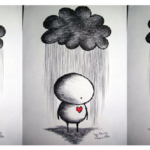The Liberating Truth About Introverts
It’s not what you’d think.
I was raised to be an A-list extrovert.
Quiet… reserved… contemplative… these were signs of weakness, indecision and overall social ineptitude. They were not allowed.
We were taught to be out-going, entertaining, delightful and gregarious.
It was kind of like being the hostess of the party, the belle of the ball, the socialite debutante starting at around age 4.
Regardless of whether you were saying hello to a neighbor at the hardware store, getting a donut in the vestibule after church or popping downstairs for a glass of milk at one of our parents’ wild cocktail parties, the expectation was the same.
100-watt smile with personality to match.
Overall, it’s a skill that’s served me well.
I am extremely capable of magnanimous behavior and know when a situation calls for cheery, witty or wickedly wild.
I can work a coffee hour, cocktail party or Saturday afternoon soccer game.
But, I find it exhausting.
This is not because I don’t like people. It’s simply that as a general rule I would rather be alone or with a very select few, with whom I feel inspired, invigorated, refreshed and curious.
On the rare occasion, after a long week of nonstop interaction, I am forced to chit chat about innane junky nothiness like the inner workings of someone’s week-long juicing fast or gossip about the politics of their tennis foursome, I get anxious.
I feel like a human firefly trapped in a glass jar with quickly depleting oxygen.
I used to fear this was because of some inner dormant psychotic wallflower syndrome that would someday fully erupt and I’d have to become a shut-in.
But, about a year ago, I discovered it is not quite so catastrophic. In fact, it’s totally understandable given that I am… drumroll… an introvert.
Introverts are commonly defined as shy, reticent.
This is garbage.
Furthermore, it does an incredible disservice to those of us who actually are introverted because it implies a sort of embarrassment or receding into the background. A lack of resilient coping skills. And dislike for people.
It suggests weakness rather than the strength.
And nothing could be farther from the truth.
According to Carl Jung, who popularized these terms in the early 20th century, introversion and extroversion is not about being outgoing or shy.
An introvert is someone for whom being around large groups of people takes away their energy. An extrovert is someone for whom being around large groups of people gives them energy.
It’s not about whether you look like a social butterfly or a hermit.
Looks can be misleading. Career choice, family size, parental involvement– there are endless circumstances that can make you appear one way and feel another.
It’s about where you get your energy.
And it comes down to three basic and yet, at least for me, life-changing questions:
- Do you like to spend time in the outer world of people and things (extraversion)? Or the inner world of ideas and images (introversion)?
- When it comes time to recharge your batteries after a long week would you rather curl up in pj’s with a good book or head out to a crowded bar?
- Do you find lots of external stimulation, like Las Vegas, exciting or overwhelming?
Most of us exist somewhere on the continuum.
Just because you skew introvert doesn’t mean you don’t like social situations. And simply because you skew extrovert doesn’t mean you don’t crave time to yourself.
However, because introverts represent only 25 percent of the population, it helps to understand what this minority population looks like.
A very dear friend introduced me to this concept of introversion via the Meyers Brigg Personality Test (http://www.myersbriggs.org/my-mbti-personality-type/mbti-basics/the-16-mbti-types.htm).
The Introvert Advantage by Marti Olsen Laney was equally insightful.
These definitions of introversion have been, for me, deeply liberating.
Perhaps this sounds silly, but having proof in the form of scientific research that there’s a reason for my sometimes puzzling temperament, intense anxiety, emotional exhaustion and occasional social overwhelm was a powerful relief.
It relieved tremendous guilt and shame about not wanting to do certain things that should by extroverted standards be fun and exciting.
Perhaps the framework for fun itself should be widened a bit.






